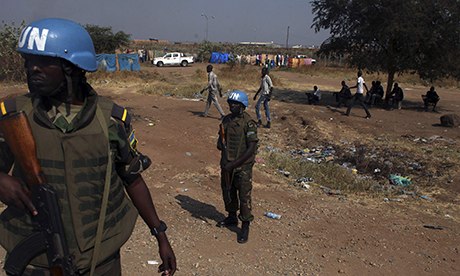
Rwandan UN peacekeepers patrol outside a UN compound in Juba, South Sudan Photograph: Andreea Campeanu/Reuters
The UN has accused South Sudanese soldiers and officials of attempting to force their way into a peacekeeping base containing thousands of displaced civilians, raising fears over the UN's ability to offer sustained protection in the war-torn country.
An estimated 65,000 men, women and children are holed up in nine UN compounds across the world's newest country, where a month of ethnically charged violence has leftandnbsp;thousands of people dead. Of 5,500 reinforcements promised to bolster the peacekeeping mission, only 25 Nepalese soldiers have arrived.
Ban Ki-moon, the UN secretary general, "is alarmed at the attempt today by senior members of the government ofandnbsp;South Sudanandnbsp;and South Sudan army to force entry into the protection of civilians site at the compound of the UN mission in South Sudan (Unmiss) in Bor," hisandnbsp;spokesman Martin Nesirky said.
"The secretary general is particularly disturbed that UN staff were threatened by the South Sudan military when they refused to allow armed soldiers to accompany civilians to visit the Unmiss protection site today."
The army denied the altercation, claiming that it was seeking to investigate reports that rebels may have discarded their uniforms to hide in the UN base in the town of Bor. The UN in turn denied this.
Bor has been repeatedly lost and won back by government forces in the conflict sparked byandnbsp;a power struggleandnbsp;between what many see as an authoritarian president, Salva Kiir, and his ambitious former deputy, Riek Machar, who are from the country's two biggest ethnic groups. Backed by Ugandan troops, the government retook Bor again on Saturday.
The UN's decision to open its bases has been praised for taking heed of past failings and probably saving thousands of lives. Jose Barahona, country director for Oxfam in South Sudan, said: "Unmiss is doing a wonderful job protecting people. We have no complaints in that sense. We would say that it must remain neutral."
After touring South Sudan last week, the UN's top human rights envoy, Ivan Simonovic, described it as "unprecedented" for the UN to open compounds for the protection of civilians irrespective of ethnicity and affiliation.
Simonovic, from Croatia, recalled that during the Balkan wars such compounds remained shut.andnbsp;Comparisons have also been made with Rwanda in 1994andnbsp;when warnings went unheeded, peacekeepers pulled back and 800,000 Tutsis and moderate Hutus were massacred. At an event at the UN's headquarters in New York to mark the upcoming 20th anniversary of the genocide, deputy secretary-general Jan Eliasson said: "The consequences of failing to heed the warning signs were monumentally horrifying.
"We must never forget the collective failure to prevent the Rwandan genocide. Repeating the phrase 'never again' is in itself a sign of continued failure."
The alleged military attempt to force entry in Bor, however, underlines how that guarantee of safety is fragile at best. The UN says it faces growing threats from both sides. Last month someandnbsp;2,000 fighters overran its compound in Akobo, killing 11 civilians and two Indian peacekeepers. Despite food and water shortages, many say they fear leaving the overcrowded bases because they will be killed.
Bor has been left in ruins by recent battles, with corpses littering the streets and scores of buildings razed to the ground, according to an
